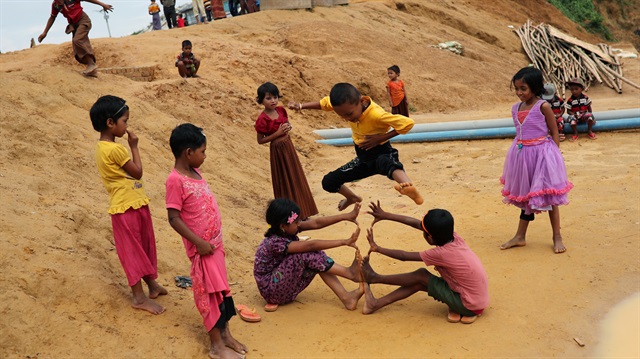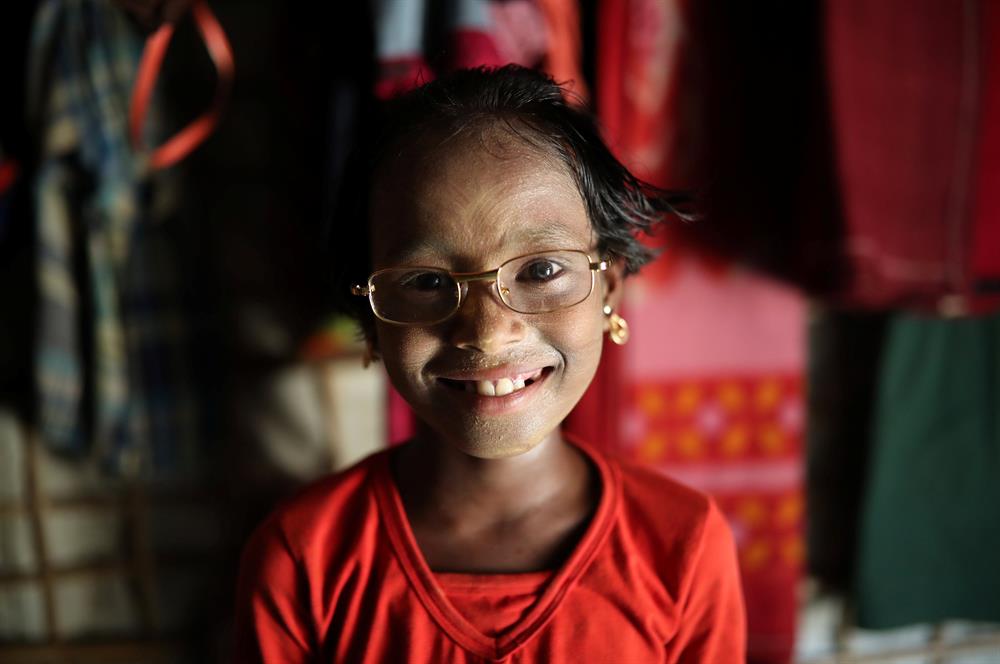

Rohingya refugee children plays in the Balukhali refugee camp in Cox's Bazar, Bangladesh
International efforts are needed to ensure education of 500,000 Rohingya children in Cox's Bazar, says UNICEF
UNICEF on Thursday called for investment in Cox's Bazar refugee camps to protect the next generation of Rohingya Muslims.
UNICEF released a report on Thursday urging for a concerted effort to build a new foundation for the rights and opportunities of Rohingya children over the longer term.
The report, titled "Futures in the balance: Building hope for a generation of Rohingya children", was released to mark one year since the start of the influx of Rohingya fleeing state persecution in the western Rakhine state of Myanmar.
UNICEF Bangladesh representative Edouard Beigbeder said in a statement that investment in education for Rohingya children was desperately needed to prepare them for the future of their community.

“If we don’t make the investment in education now, we face the very real danger of seeing a ‘lost generation’ of Rohingya children, children who lack the skills they need to deal with their current situation, and who will be incapable of contributing to their society whenever they are able to return to Myanmar,” said Beigbeder.
Children in the refugee camps “face a bleak future, with few opportunities to learn, and no idea when they might return home,” UNICEF warned in the report.
It called on the international community to invest “in supporting quality education and life-skills for all Rohingya children, especially girls and adolescents who it says are at risk of being excluded”.
Only 140,000 out of half a million Rohingya children in the camps had been enrolled in 1,200 learning centers as of July 2018, according to UNICEF.
“However, there was no agreed curriculum, classrooms were often overcrowded and lacked basic water and other facilities,” it added.
The report also called on the Myanmar government to ensure education for Rohingya children who still live in the Rakhine state demanding it also to protect the Rohingya minors.
The UN body pointed out that “a lasting solution to the crisis of the Rohingya requires addressing the situation inside northern Rakhine”.
In 2018, the agency appealed for $28.2 million for its work on education for Rohingya refugees. Just over 50 percent of that sum has been received so far.
Saturday, Aug. 25 will mark a year since more than 750,000 Rohingya refugees, mostly children and women, have fled Myanmar and crossed into Bangladesh after Myanmar forces launched a crackdown on the minority Muslim community, according to Amnesty International.
More than 24,000 Rohingya Muslims have been killed by Myanmar’s state forces since then, according to the Ontario International Development Agency (OIDA).
The Rohingya, described by the UN as the world's most persecuted people, have faced heightened fears of attack since dozens were killed in communal violence in 2012.
The UN documented mass gang rapes, killings -- including of infants and young children -- brutal beatings, and disappearances committed by Myanmar state forces. In its report, UN investigators said such violations may have constituted crimes against humanity.
#Rohingya
#infants
#young children
#Myanmar state forces
#refugee
#UN investigators
#Rohingya children's education
#Cox's Bazar





